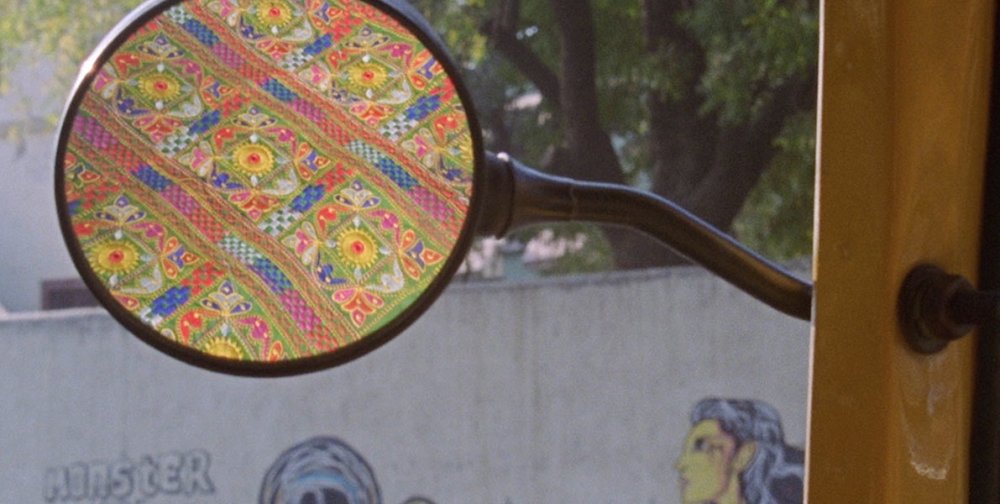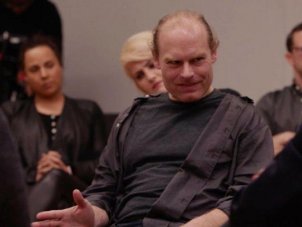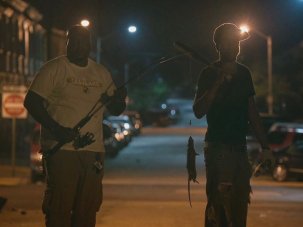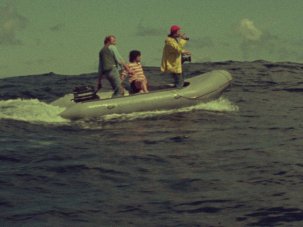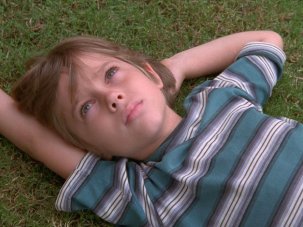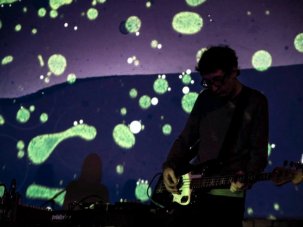Deep in the red state of Missouri, True/False Film Fest is a progressive, vibrant, rough-around-the-edges gem. The theme this year was Stranger <-> Host, asking the audiences to think about the symbiotic relationships that can emerge from unexpected or unlikely connections, with short animated commissions before each feature film that brought together poetry and science. Speaking on retroviruses, a virologist says: “It’s not an either/or – are these things good or bad? It’s a lot more complicated than that.” It’s this complexity, and the space to consider and discuss, in which the festival excels. True/False creates an environment that dissolves barriers – true/false, fiction/nonfiction, art/artist, audience/participant, illusion/reality.
The 16th True/False Film Festival ran 28 February–3 March 2019 in Columbia, Missouri, USA.
‘Provocations’ before several of the films bring fresh and radical perspectives to the audiences. Independent from the films they precede, a handful of provocateurs question the way we perceive the world and connect with one another and the ethical complexities that can arise.
T/F 2019 Sunday Bumper, with words by Marc McKee, science by Dr. Brad van Paridon and animation by Chelsea Myers
Before Untitled Amazing Johnathan Documentary, essayist and critic Andrea Long Chu came on stage, gave an audience member a remote control and told her to hit the button as often or little as she wished, before launching into a talk about performance art, her own body and what the remote may control. She illuminated the what-ifs and their implications, involving Chu, the remote control volunteer and the wider audience.
Chu’s provocation turned out to be an astute preamble to the film that followed, a hall of mirrors that is simultaneously an incredibly funny documentary and an irreverent signpost to the illusory nature of documentary filmmaking. Opening with the disclaimer that “this film is based entirely on the available facts”, Ben Berman’s Untitled Amazing Johnathan Documentary is a film about subversive magician/comedian John Edward Szeles, AKA Amazing Johnathan, who was given a year to live but is still with us three years later. Amazing Johnathan decides to do a farewell tour and it emerges that there are more people making documentaries about Johnathan, including an academy award-winning team: Berman has serious competition.
The film is self-reflexive: we, as audiences, rarely consider the potential parade of other film teams who may have tried to complete a doc about the subject we’re watching but came up short. The sleight of hands and illusions that Johnathan creates are reflected in Berman’s twists and turns. Can you ever trust anything a magician does? Can you ever trust anything a nonfiction filmmaker puts forward as the whole truth? As Berman says, “You should be skeptical of every documentary you see.”
Director Ben Berman talks Untitled Amazing Johnathan Documentary at the Sundance Film Festival
True/False plays with the unbelievable in nonfiction. One of the events, Gimme Truth, was a raucous live gameshow/drinking frenzy with three filmmakers as jury and a comedy host on stage. A sequence of very short films posing as documentaries were screened before the individuals responsible defended the truth of their pieces to the jury, the audience roared their verdict, and the jury cast their final votes of true or false.
The festival is political, provocative and one hell of a party. It showcased excellent, urgent nonfiction filmmaking, such as Midnight Traveler by filmmaker-in-transit Hassan Fazili, which was awarded the True Life Fund to help the family with their ongoing legal fees in their search for a safe home. There were astounding investigative films, such as Jialing Zhang and Nanfu Wang’s One Child Nation, which spirals from the personal impact of the one-child policy on Wang’s family and out into the all-encompassing power held over a nation. And there were those that exuded a galvanising power, like Rachel Lears’ Knock Down the House, which celebrated the rise in women of colour running for political office, featuring the incredible Alexandria Ocasio-Cortez.
Knock Down the House teaser trailer
There were films that meandered into the metaphysical. Brett Story’s The Hottest August is an absorbing social study about hopes, dreams and our current climate. It’s 2017, an abnormally hot summer and the year of a partial lunar eclipse. Story talks to New York locals: there is a sense of uncertainty and instability in the air. A fantastic free-form jazz soundtrack undulates over the images of people going about their summer, making the mundane seem strange and alien. Two men contort themselves to squeeze out of a window-frame and offer their thoughts on the economy and immigration. A man chases an errant sun umbrella across the beach; an afronaut walks the streets of New York, solving problems by conceptually approaching the situation from the future. It’s as if the film is trying to describe human existence to an audience from the future.
The dioramas of New York’s Natural History Museum seem poignant, framed in this tonally off-key perspective, standing like the strange relics of misguided, wreckless beings. Things have never been like this, exclaim the film’s interviewees. Retired policemen praise the changes brought by gentrification. On the news, the car ploughs into the protestors at Charlottesville. The skies that Story captures are magnificent and dramatic, deep grey storm clouds against a shimmering amber sky. It is a wakeup call, reminiscent of Ali Smith’s sentiment in her novel Autumn: “All across the country, people felt history at their shoulder. All across the country, people felt history meant nothing.”
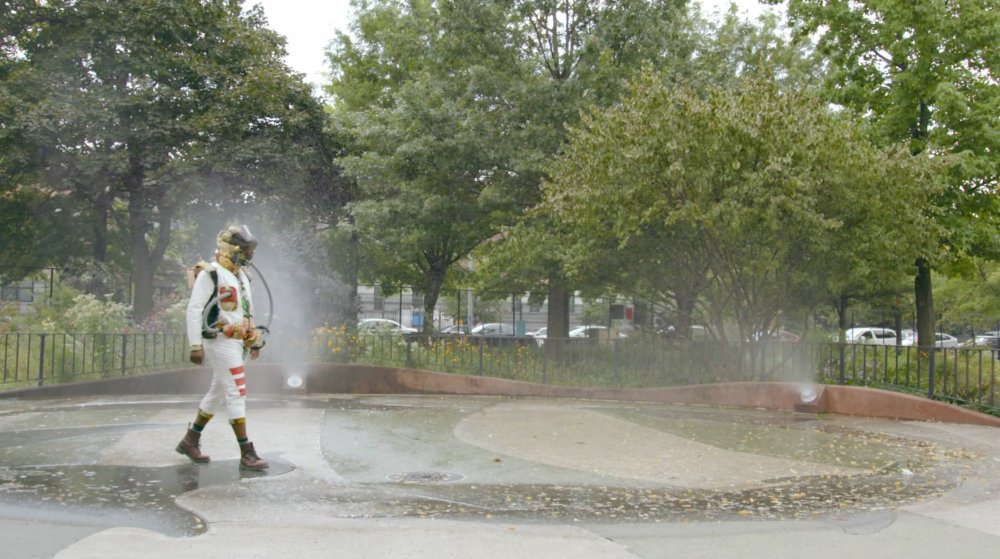
Brett Story’s The Hottest August
When making The Grand Bizarre, Jodie Mack wondered how we could describe material detritus to an alien. In her stop-motion animation, clothes and fabrics take on a life of their own, straddling countries and maps on planes, trains and automobile mirrors. The film explores cross-cultural appropriation in the age of saturated capitalist mass-production and, as she said in her introduction, “the brightest coloured dyes are the most toxic”. Colours, textures, symbols, tattoos and alphabets flicker over one another, an overload of information and movement that reflects the speed of the internet. Through this rising tide of over-saturation, Mack considers how we create language, the power dynamics of global capitalism, and Western academics. Her field recordings are shaped into rhythmic compositions, creating a dynamic, organically mutated soundtrack.
The experimental sound design by François-Eudes Chanfrault in Celebration creates a phenomenal dissonance: models glide elegantly through the corridors of the Yves Saint-Laurent fashion house, enveloped in an unnerving whispering soundtrack, while Yves looks on quivering and haunted. This documentary was built from years of observational footage, and retains elements of twisted power dynamics reminiscent of Paul Thomas Anderson’s Phantom Thread, with Pierre Bergé, Yves’s patron and sometime partner, spying on Yves as Yves observes a model.
Celebration trailer
Director Olivier Meyrou described in the Q&A how the soundtrack was an attempt to recreate the atmosphere they felt during shooting, how you could feel strong waves of energy emanating from Yves. In an archive interview, Yves says he’s putting an end to his permanent state of fear and anxiety and looking for serenity, yet elsewhere Bergé describes Yves as a sleepwalker who must not be woken. In a post-screening Q&A Meyrou recalled his encounter with the designer, who told him “I don’t understand the world, but I feel it.”
Director Nuria Ibáñez Castañeda received the True Vision award for her work. She attended the festival with her most recent film A Wild Stream (Una Corriente Salvaje), a film of longing and loneliness that recalls the work of Wong Kar-wai and Claire Denis. In it, wind rattles around a desolate trailer as two men live out their solitary existence on a beach in the Sea of Cortez. New arrival Chilo spends time with Omar, sharing anecdotes about octopus-hunting as well a deeper concerns. The sense of desire is implied, yet palpable – the sweat glistening on Omar’s body as he detangles the net; his wet shirt as he wades in the lake. Chilo sings yearning love songs and their friendship is tentatively flirtatious. Chilo and Omar get closer, and their intimacy is lit by striking pink and purple skies.
A Wild Stream trailer
Castañeda’s film encourages us to wander into the depths of consciousness, in the way that some narratives are more sensory, intuitive and allow meaning to materialise in atmospheres. Heidegger praised the Greek myths for valuing the truth in moods rather than reason. Having the space to feel your way through a film encourages a more active emotional engagement than the illusory achievement of fact-gleaning in more conventional docs – the feeling that by the act of watching and being incensed, the work is done.
In Treasure Island, director Guillaume Brac’s dreamy wandering through a water park heads into darker waters. The film is a slow-burn piece that draws the viewer in with a group of teen boys trying to sneak past the security guardians, trying their luck with girls; a guy floundering on a jet pack like a deflating balloon; the raucous joy of kids chanting in their paddle boats. While employees take paddle boards into forbidden spaces after hours, the rule enforcers sit in their office, disconnected from the reality of the space.

Treasure Island (2018)
The feeling of timelessness and freedom mutates with the adults’ stories, with the tone shifting as they remember being persecuted in their home countries. Although the meandering, drifting approach continues, it is like waking up from a carefree dream into a hostile reality; an artificial dream surrounded by borders and barriers, a microcosm of our world.
True/False was full of riddles and alternative perspectives – such as that of director Miko Revereza in No Data Plan: “How does an undocumented documentary filmmaker document himself?”
No Data Plan trailer
Listening was seeing in Eleanor McDowall’s Radio Atlas. McDowall was premiering a translation of a 1971 Danish radio documentary, The Night Watchman by Stephen Schwartz. Schwartz developed an interview technique that encouraged his interviewees to visualise what they saw, so as to create a vivid sequence of sharp images for the listener.
In The Night Watchman a security guard walks us through his nightly rounds at a science lab/morgue. The words and sounds are profoundly cinematic, the black screen is a canvas for the virtual images evoked. The Night Watchman played alongside a French radio doc, Charlotte Bienaime’s Colette’s Podcasts, in which a radio documentary enthusiast plays through some of the highlights of the broadcasts she’s taped – including a beautiful, haunting recording of a pack of wolves tuning up. The translations are a ground-breaking move towards making these brilliant international documentaries accessible, and connecting experiences.
One of the closing screenings of the weekend was an homage to Wim Wenders’ Room 666, his 1982 documentary that featured filmmakers and actors in a hotel room at Cannes Film Festival responding to the question concerning the future of cinema. The True/False 2019 instalment of Room H.264 – the third in a series – was shot and edited during the course of the festival by Eric Hynes, Jeff Reichert and Damon Smith, who pose the question to a selection of nonfiction filmmakers: “Is cinema a dead language, an art that is already in the process of decline?”
The responses were wide and varied and predominantly experimental. Some disrupted the static formality, taking the camera from its tripod for an adventure; others deconstructed the question, or discussed the obstacles in filmmaking, or played with the perceived parameters of film. There felt a shared desire to defy expectations, break formality, and a tangible generosity. Some contributors considered their privilege, others spoke of how patriarchy has shaped the way cinema looks and feels; another filmmaker stated we need to decolonise every aspect of our society. As Steve Bognar and Julia Reichert tiptoe around the room, whispering urgently to one another as they create a mysterious cat’s cradle of cords dividing the space, they run out of time. “It was a concept,” Reichert whispers.

Room H.264 (2019)
The film speaks to both the playfulness and serious critical thought behind the festival. True/False illuminates the imaginative potential of education, activism and art. It’s a space for all and a refuge for critical thinkers and creative disrupters to consider the potential of nonfiction cinema; thinking beyond the binary of good film/bad film, getting to heart of film’s power, how it feels, and considering what comes next.
In a Q&A after The Hottest August, Brett Story described a growing feeling that motivated her: a sense of dread and her concern that climate change is treated as a scientific enquiry rather than part of our everyday environment. She was interested in how people are coping with underlying anxieties related to safety, housing, police violence and growing fascism, the state of the country and the state of the world. “There’s no future alone, it’s a collective struggle,” she said.
The programme at True/False asks: what if we had the vision to see this moment in history as something we can affect, now, together? How can art affect change? With art providing new ways of communicating with each other, here is the importance of dreaming and creating an alternative narrative or future beyond the systems that aspire to hold us.
In the March 2018 issue of Sight & Sound
Artists’ moving image: Material girl
In her short, structurally rigorous, always playful films, Jodie Mack approaches something like why not say it? – perfection. By Nick Pinkerton.
-
The Digital Edition and Archive quick link
Log in here to your digital edition and archive subscription, take a look at the packages on offer and buy a subscription.




